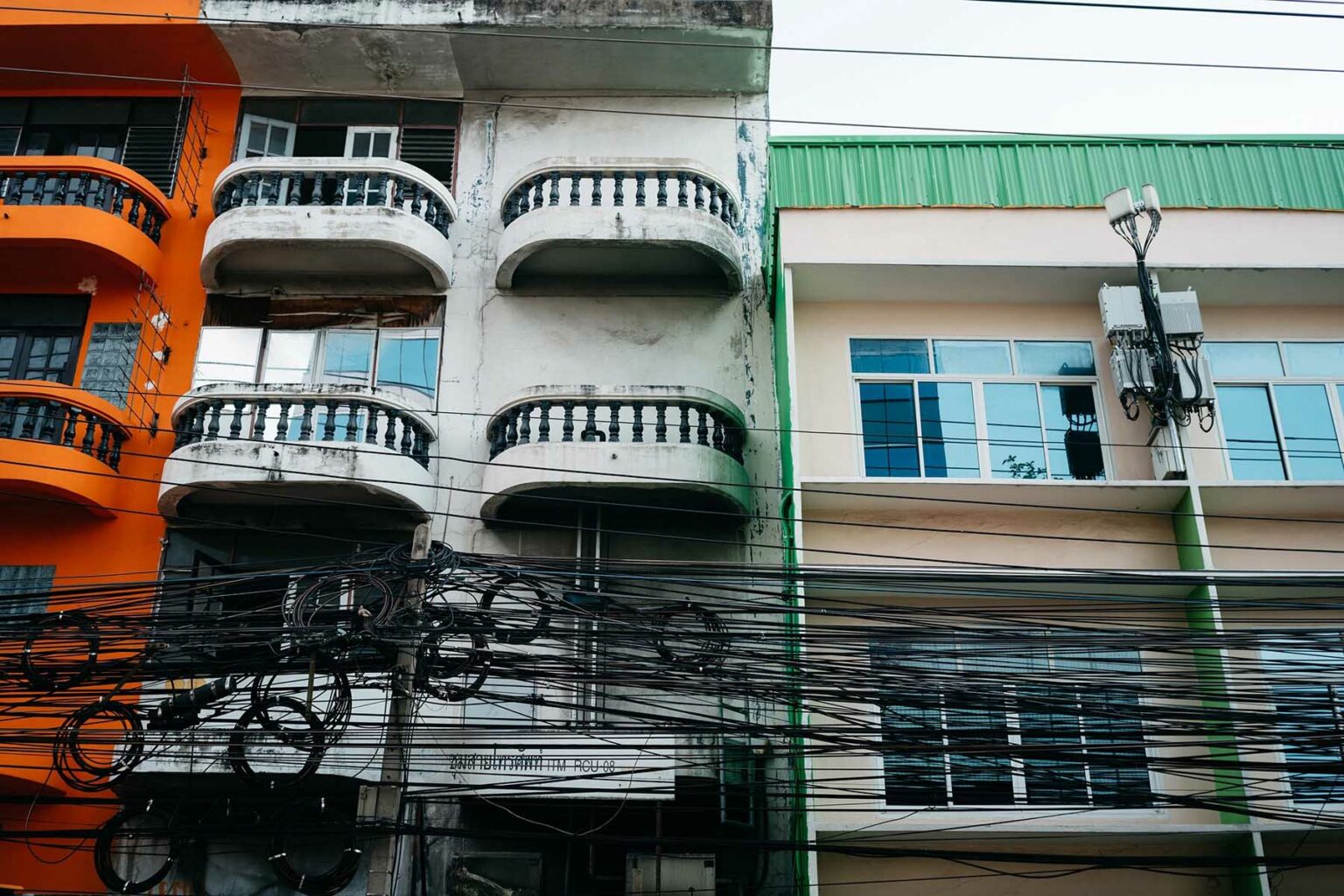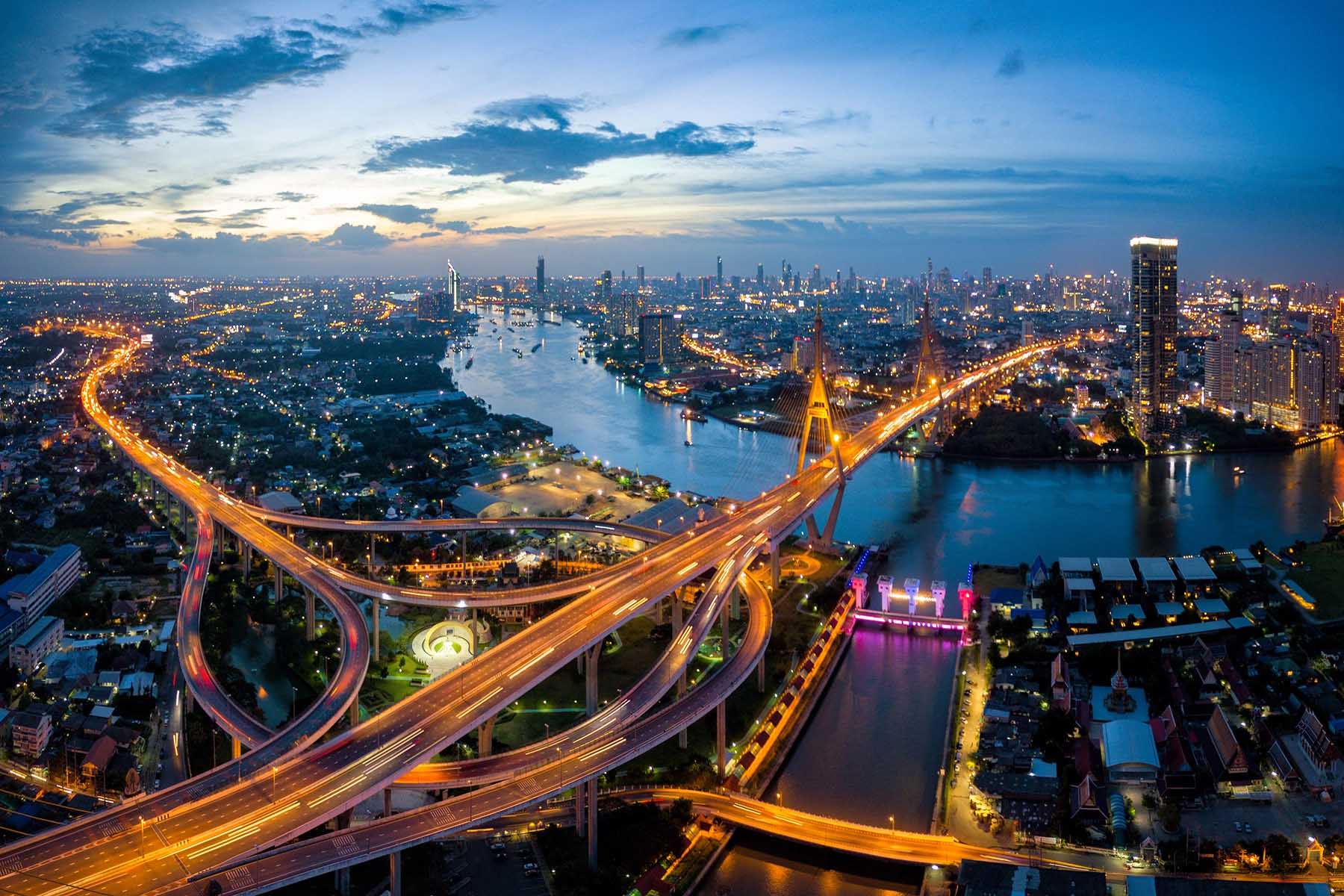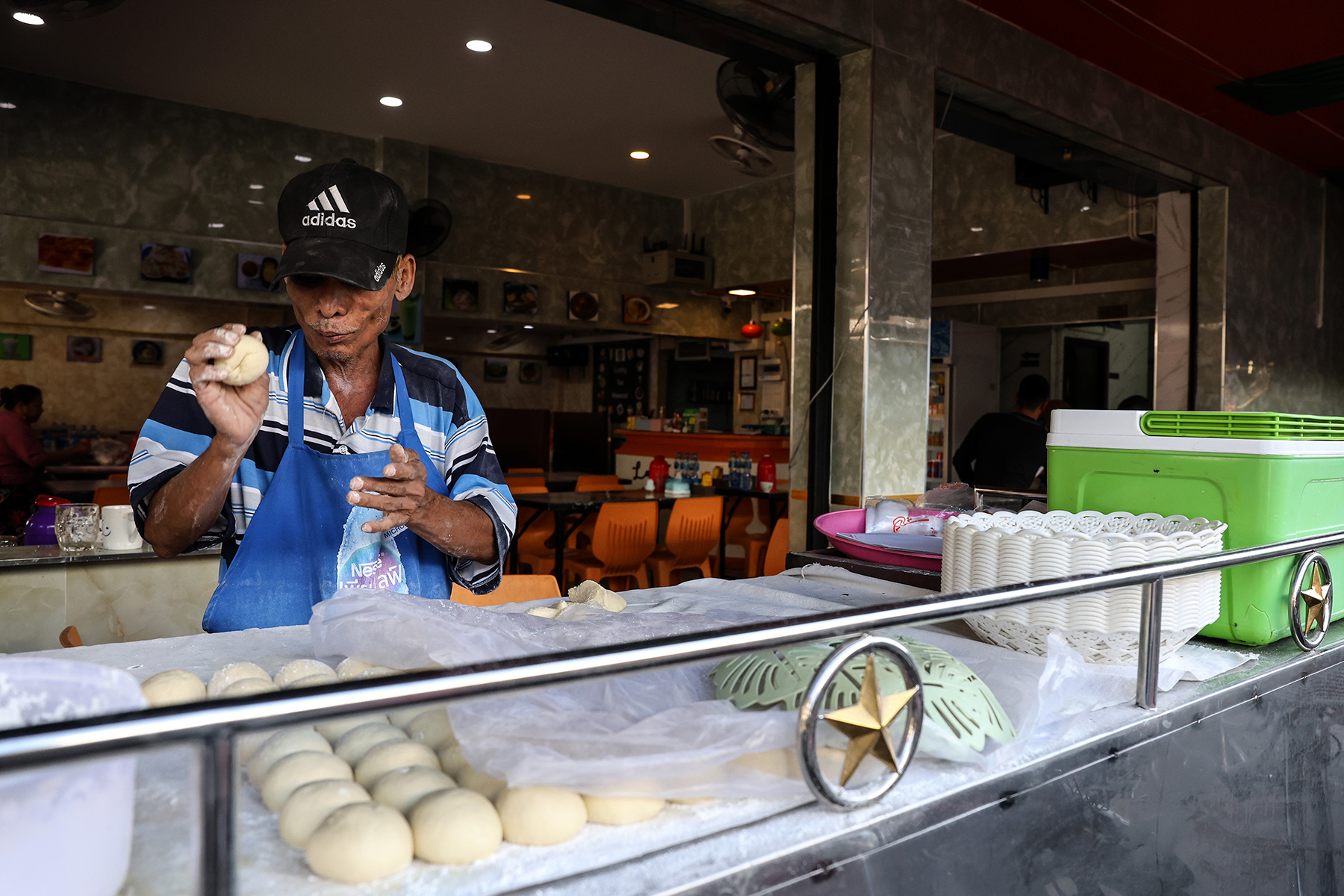If you’re new to Thailand (ประเทศไทย), your to-do list might seem quite daunting. Once you’ve rented a house or bought a condo, you’ll have lots of other things to organize, like hooking up your utilities (สาธารณูปโภค), internet, and TV.
Luckily, getting your water, electricity, and gas (น้ำไฟฟ้าและก๊าซ) sorted is straightforward, and the prices are reasonable compared to many countries in the Global North.
Find out all about getting utilities set up in Thailand with information on all the following topics:
- Utilities in Thailand
- Electricity in Thailand
- Who are the electricity suppliers in Thailand?
- Can you access green energy in Thailand?
- How can you install solar panels?
- How do you connect and disconnect your electricity utility?
- Can you change electricity suppliers?
- What are the electricity costs and tariffs in Thailand?
- How do you report electrical faults and carry out electrical repairs?
- How do you complain about a Thai electricity company?
- Gas utility in Thailand
- Water supply in Thailand
- Who are the water suppliers in Thailand?
- Are there any initiatives promoting water sustainability in Thailand?
- How do you connect and disconnect water utilities in Thailand?
- Can you change water suppliers?
- What are the water supply costs and tariffs in Thailand?
- How do you report water leaks and carry out repairs in Thailand?
- How do you complain about a Thai water provider?
- Useful resources
Utilities in Thailand
In Thailand, all utilities are managed and distributed by state-owned bodies, with separate authorities for around Bangkok (กรุงเทพมหานคร) and the rest of the country. The country has no mains gas supply, so you will have to buy cooking gas in canisters (ถังแก๊ส).
If you’re renting a property, utility bills will likely stay in your landlord’s name, so you may not need to deal with these organizations much. However, if you buy a property, handling utilities will be your responsibility.
In Bangkok, the authorities are:
- Metropolitan Electricity Authority (MEA – การไฟฟ้านครหลวง กฟน)
- Metropolitan Waterworks Authority (MWA – การประปานครหลวง กปน)

In all other parts of the country, you will deal with the local office of the:
- Provincial Electricity Authority (PEA – การไฟฟ้าส่วนภูมิภาค กฟภ)
- Provincial Waterworks Authority (PWA – การประปาส่วนภูมิภาค กปภ)
All these bodies come under the remit of the Ministry of Interior (กระทรวงมหาดไทย). Electricity is generated under the umbrella of the Electricity Generating Authority of Thailand (EGAT – การไฟฟ้าฝ่ายผลิตแห่งประเทศไทย) through a mixture of public and private companies.
While Thailand produces some renewable energy (พลังงานทดแทน), the amount is still quite low compared to many other nations worldwide, at 14.9%. Surprisingly, for a country with so much sunshine, only 24% of its renewable energy comes from solar power (พลังงานแสงอาทิตย์).
Electricity in Thailand
Most people in Thailand use electricity as their main energy source, though in homes with traditional Thai-style, outside kitchens, people often cook with gas. All other appliances run off electricity.
The power supply in Thailand is similar to Europe, at 220 volts AC, at 50Hz. This means that appliances from Asia and Europe work in Thailand, but if you are bringing electronics from the United States or another country that uses a different voltage, you must use a converter (คอนเวอร์เตอร์).
The plugs used in Thailand are almost all two-pin, and most sockets take either plugs with flat pins (A and B), like those used in Japan and the US, or round pins (C and O), like those used in Europe and much of the rest of Asia. Some modern condos and hotels have universal sockets that take all types of plugs, but it’s best to bring adapters with you for essential appliances. You can find these in some convenience stores and at any electrical appliance shop.
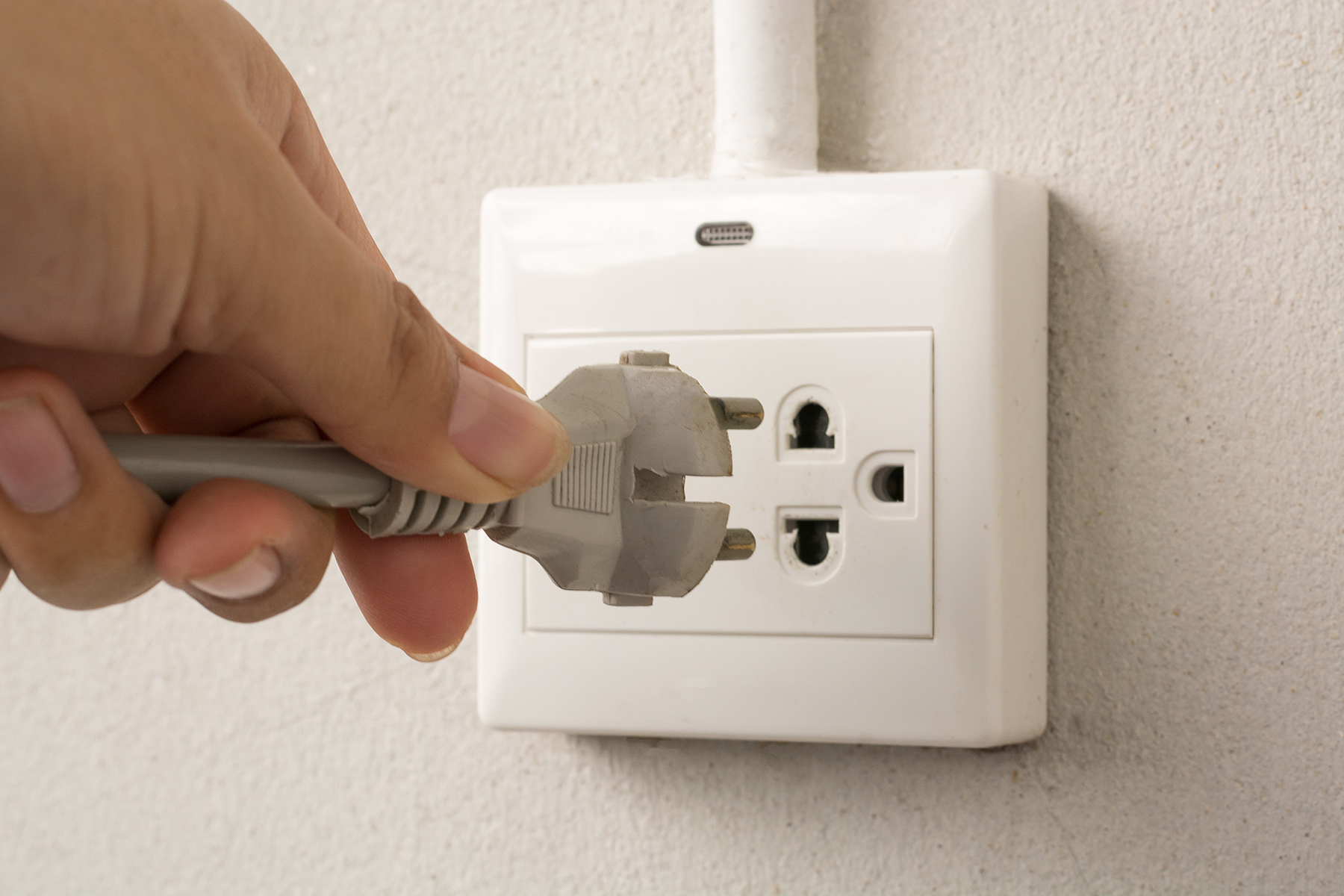
Electrical safety standards in Thailand are often lacking. Regulations exist, but they are often ignored or overlooked, meaning many buildings, especially older ones, are not grounded. As a result, there is no earth connection, so the risk of electric shocks is much higher. If you buy a property, it’s a good idea to get a qualified electrician to check the wiring and ground your system.
Who are the electricity suppliers in Thailand?
Depending on where you live in Thailand, the MEA or PEA supplies all your electricity. The MEA covers the greater Bangkok Metropolitan area, including Bangkok, Nonthaburi (นนทบุรี), and Samut Prakan (สมุทรปราการ). The PEA caters to the rest of the country and has offices in every province. Their general contact details are:
Metropolitan Electricity Authority (MEA)
- Contact center: 1130
- Email: callcenter@mea.or.th
Provincial Electricity Authority (PEA)
- Contact center: 1129
- Live chat
Can you access green energy in Thailand?
Unfortunately, it’s not possible to choose to use green energy in Thailand unless you go off the grid. However, about 14% of the country’s electricity comes from renewable sources, including solar, wind, hydropower, biomass, biogas, geothermal, and biofuels. Additionally, the government aims to increase this to 30% by 2037.
How can you install solar panels?
The potential for solar power in Thailand is very high, with Bangkok averaging seven hours of sunshine a day. Although most people have yet to take advantage of this, developers are starting to add solar panels to new developments, especially in the Bangkok area.
Right now, it’s only a good idea to install solar panels if you own a house. The government has some incentives for businesses to use solar power, but they don’t have any subsidies if you want to install solar panels on your home. Fortunately, the private sector is stepping in, with a major Thai bank recently offering free installation and interest-free loans for solar panels.
If you decide to install solar panels on your house, you must buy them from a private company. You can expect it to cost around ฿200,000, meaning it will take 5–10 years to pay off the investment.
How do you connect and disconnect your electricity utility?
When you move into a rental property in Thailand, especially a condo or apartment, it will almost certainly have an active electrical connection. Most landlords keep the bills in their name, but the bill will still come to your address.
However, if you buy your own house or are moving into a place that has been empty for a while, you may need to organize your own connection. To do so, visit your nearest PEA or MEA office with the following:
- A form of ID, ideally your passport
- A rental contract, mortgage documents, or other proof of address
It usually takes about one week to get connected. If you need to disconnect the electricity from a property, the process is the same in reverse. Again, you can expect it to take about a week for them to process your request.
Can you change electricity suppliers?
Unfortunately, in Thailand, you cannot change your supplier, as utilities are all managed by the government.
What are the electricity costs and tariffs in Thailand?
The cost of electricity in Thailand is generally very affordable, especially compared to European or North American countries. A unit of electricity costs around ฿5, although this price changes based on supply, demand, and the economy. This means, on average, monthly electricity bills are around ฿500–4,000. The final bill will depend on your house size and how much power (especially air conditioning) you use.

It is important to note that some condos and apartments add an extra charge onto electricity bills for residents, so electricity sometimes costs as much as ฿8 or ฿9 per unit. This can almost double your electricity bill, so when renting a property, it’s a good idea to check if they charge the standard government rates or their own rates.
Paying electricity bills is easy, and there are several options. However, it’s important to pay on time because after the due date, you’ll need to visit your local PEA/MEA office. Payment options include:
- Direct debit from your Thai bank account
- QR scan payment using a Thai banking app
- Via the PEA/MEA app
- Counter payment at 7–11 stores
- At most ATMs
- At the PEA/MEA office
How do you report electrical faults and carry out electrical repairs?
If you have a problem with your electricity supply, the first point of contact should be the PEA or MEA contact center:
- MEA contact number: 1130
- PEA: 1129
When you call them, be sure to have your 12-digit customer number from your electricity bill and the name it is in.
Power outages are becoming less common in Thailand, and the PEA/MEA are generally quick to fix problems, especially in urban areas. However, in more remote areas, especially in the rainy season, storms can cause extended power outages.
Finding a properly qualified electrician can be difficult when you need electrical repairs for your home. While they do exist, it can be hard to find one if you don’t speak Thai. Asking for recommendations from friends and neighbors is a good idea. And if you live in Bangkok, you can use various directory services that claim to vet all the professionals on their books.
How do you complain about a Thai electricity company?
If you need to complain about the MEA or PEA, you can fill out complaint forms on both their websites. However, it will probably be more effective to go in person to your local office with a Thai speaker to make the complaint in person. If you’d prefer to get in touch online, visit:
- MEA complaints
- PEA complaints (in Thai)
Gas utility in Thailand
Despite many people in Thailand cooking with gas, the country has no mains supply.
If you have a gas cooker, you can buy liquified petroleum gas (LPG) canisters from a local shop. You can ask your neighbors for recommendations or search for “ร้านแก๊ส” (gas shop) on Google Maps. However, the shop’s staff will probably not speak much English, so it’s a good idea to take a Thai speaker with you to make sure they deliver to the correct address.
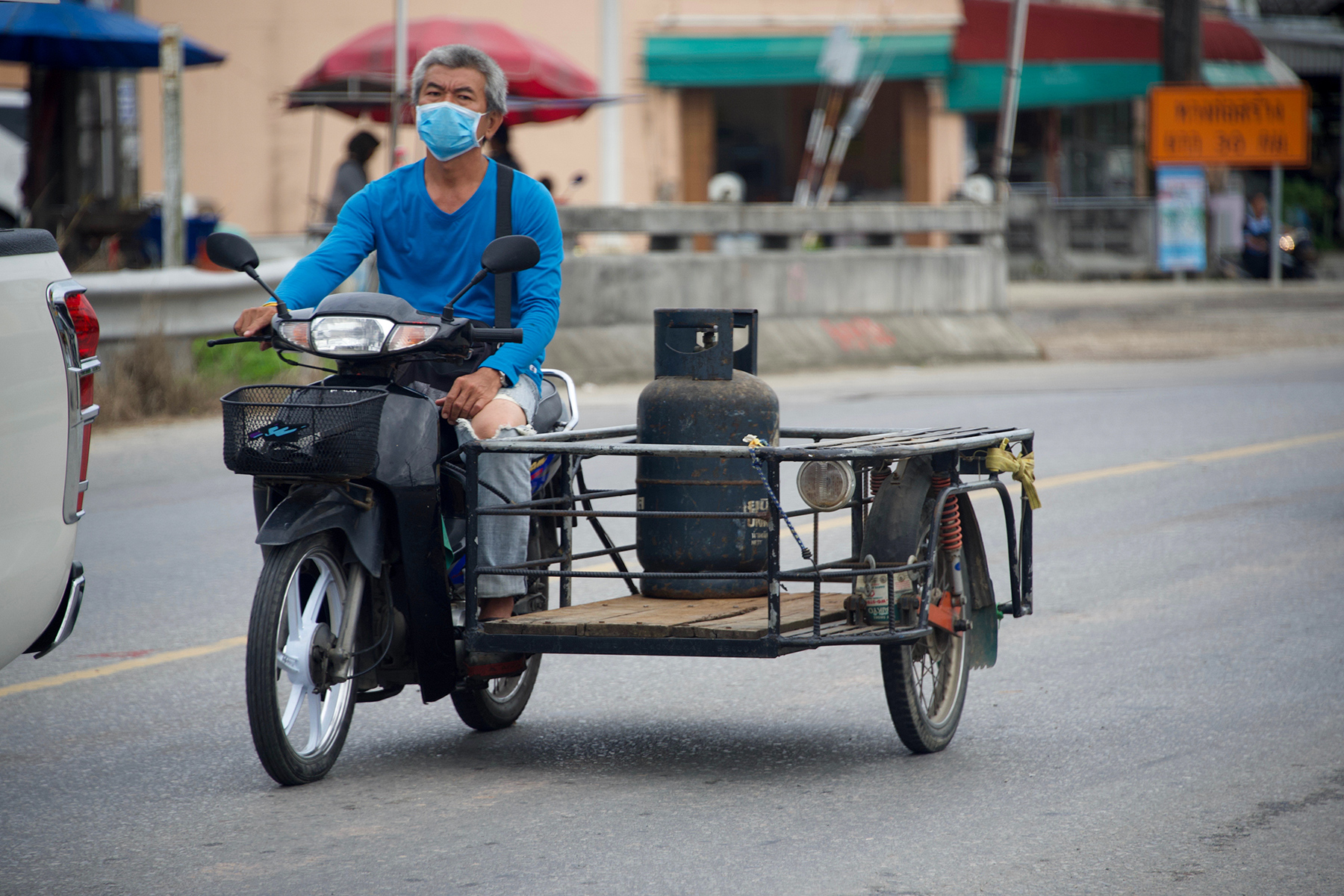
The first time you buy a canister of LPG, you pay a deposit for the canister plus the cost of the gas. The deposit will be around ฿1,000 to ฿1,500, and the gas will likely cost ฿300–500. When you need to replace the canister, call the shop. They will deliver a fresh one and take away the old one to be refilled.
When you move out of your house, call the shop to collect the canister and return your deposit.
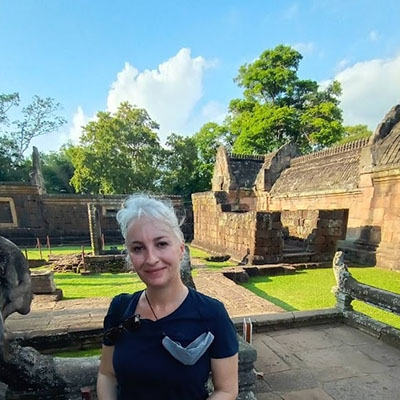
Local expert
Jane Evans
Insider tip
If you live in a condo or apartment, you will almost certainly be prohibited from using gas.
Water supply in Thailand
Other than in extremely remote regions, mains water is distributed around Thailand by state-owned bodies, which also deal with sewage treatment in urban areas.
While technically, most water in Thailand is safe to drink when it leaves the water treatment facilities, by the time it reaches your home, it’s unlikely to be safe to drink. This is due to old, leaky pipes and soil contamination. People tend to either treat their water at home or buy drinking water in bulk. The main options are:
- Buying filtered water in crates or large bottles from a local company that delivers – ask your neighbors or condo management for the local company’s contact details. These bottles can be collected and refilled.
- Installing a water filtration system to your kitchen sink for all drinking and cooking use
- Buying filtered water from a local reverse osmosis filtration machine. These can be found in urban areas. Check the cleaning and maintenance schedule for these machines.
- Buying water in plastic bottles from your local supermarket. This is the most expensive and least environmentally friendly option.
Water security in Thailand is likely to become a more serious issue in years to come. At present, in drier years, there may be water restrictions in certain areas during the dry season, particularly for agriculture and industry. This is likely to become more of an issue in the future.
Who are the water suppliers in Thailand?
In Thailand, water is supplied through either the MWA or PWA, depending on where you live. The MWA services the greater Bangkok Metropolitan area, including Bangkok, Nonthaburi, and Samut Prakan. The PWA looks after the rest of the country and has offices in every province. Their general contact details are:
Metropolitan Waterworks Authority (MWA)
- Contact center: 1125
- Email: mwa1125@mwa.co.th
Provincial Waterworks Authority (PWA)
- Contact center: 1662
- Live chat
Are there any initiatives promoting water sustainability in Thailand?
In line with the sustainable development goals, Thailand is working towards better water management and universal access to clean water and sanitation. The country is prone to both flooding and droughts, so management of water resources is an important priority.

While there aren’t any government schemes to promote water conservation, private companies sponsor some educational initiatives.
How do you connect and disconnect water utilities in Thailand?
If you are moving into a condo or apartment, you are unlikely to have to deal with connecting your water supply, but if you have bought a house or are renting somewhere that has been empty for a while, you may need to get the water reconnected.

Local expert
Jane Evans
Insider tip
You may also need to get your water reconnected if you are late paying a bill – the PWA can be very efficient at disconnecting your water supply if your payment is overdue.
To set up a new connection, you will need a form of ID and proof of address, and for a reconnection, you will need the customer number from your water bill. To get connected, contact your local PWA or MWA office. It generally takes a day or so to reinstate your water, but a new connection can take up to a week.
If you are moving out and need to disconnect your water supply, contact the PWA or MWA office with your customer number. It’s best to get in touch a week in advance to organize this.
Can you change water suppliers?
As all domestic water supply comes under the MWA or PWA, it’s not possible to change water suppliers in Thailand.
What are the water supply costs and tariffs in Thailand?
Water bills are generally quite low in Thailand. The MWA/PWA cost per unit depends on usage and ranges from ฿10.20–21.20. The minimum monthly water bill is ฿50, and most people spend between ฿100–200 a month on water.
In condos or apartments, the building management usually looks after the water supply. This means the price per unit will likely be higher than the government rate. Most buildings have water tanks on the roof in case of a water outage. However, total bills are still unlikely to be over ฿200 a month.
How do you report water leaks and carry out repairs in Thailand?
If you encounter a mains water leak in Thailand, you should call the waterworks authority in your area:
- MWA contact center: 1125
- PWA contact center: 1662
When you have a leak in your home, you should call a local plumber to fix it. If you live in a condo, the office should be able to recommend someone, or they may even have a maintenance worker you can use. If you live in a house, you can ask your neighbors for recommendations for reliable plumbers.
How do you complain about a Thai water provider?
If you need to make a complaint about the MWA or PWA, you can do so via their websites. However, it will probably be more effective to go to your local office with a Thai speaker to address the problem in person. If you’d rather handle it online, you can try the following links:
- MWA complaints (in Thai)
- PEA complaints (in Thai)
